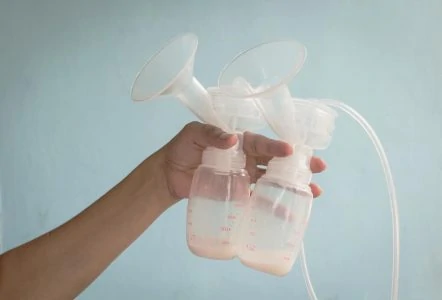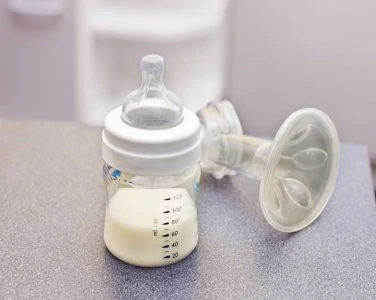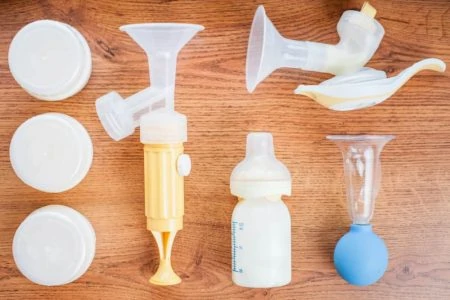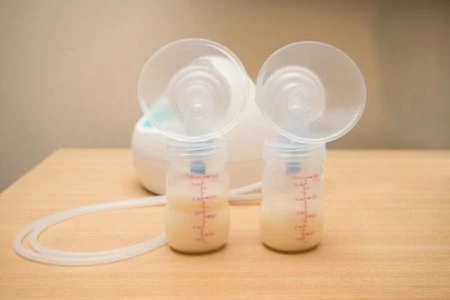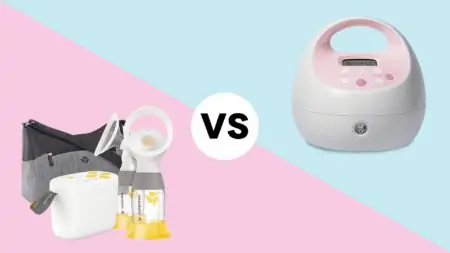Key Takeaways
- The right choice depends on how often you’ll pump, your budget, comfort needs, portability, and where you’ll use it.
- Manual pumps are great for occasional pumping, travel, backups, and tight budgets; they’re quiet, light, and simple to clean.
- Electric pumps (especially double-electric) are best for returning to work, exclusive pumping, or multiples; they’re faster and more efficient.
- In the US, most health plans cover a breast pump and lactation support under the Affordable Care Act, but coverage (manual, single/double-electric, or rental) varies. Call your insurer before you buy.
- Hand expression is a free, portable skill that can boost output and relieve fullness with or without a pump.
- Good fit matters most. The right flange size and gentle settings help comfort, output, and supply. An IBCLC can help you fine-tune.
How Often Will You Be Pumping?
If you’re nursing most feeds and only pumping here and there, a manual pump is often enough. It’s fast to grab for the occasional date night, gym session, or to relieve pressure. If you’ll be separated from your baby daily (back to work, school, or NICU stays), a double electric will save time and help maintain supply.
Here’s a quick snapshot to match your routine:
- Occasional use: Manual pump or hand expression is typically sufficient and budget-friendly.
- Daily sessions: Single or double electric helps you empty more efficiently in less time.
- Exclusive pumping or multiples: Hospital-grade or high-performance double electric is the most efficient option.
Moms who are separated from their babies (due to maternal or newborn illness) and moms of multiples may need a more efficient pump. Renting a hospital-grade double electric pump is the best option in these situations.
Editor's Note:
Michelle Roth, BA, IBCLCWhat Is Your Budget?
Sometimes price is the deciding factor. Manual pumps are inexpensive and can be a smart starting point or backup. Electric breast pumps cost more, but they’re faster and often more comfortable once dialed in.
In the US, most health plans cover a breast pump and lactation support. Coverage varies (manual vs. electric, single vs. double, purchase vs. rental), so check your benefits and approved models before you buy. If you plan to pump frequently, ask specifically about a double-electric option or a hospital-grade rental.
If finances are tight, don’t overlook hand expression. Many moms efficiently hand express milk and skip a pump altogether when needed.
Portability and On-the-Go Use
While electric pumps can travel, manual pumps are the lightest, quietest, and simplest to clean. They’re great for planes, car trips, and quick breaks. That said, today’s electric pumps are more portable than ever—many include rechargeable batteries, compact motors, and discreet carry bags.
If mobility matters, look for:
- Rechargeable battery: Pump anywhere without hunting for an outlet.
- Wearable or in-bra cups: Truly hands-free pumping under a shirt for multitasking.
- Lightweight kit: Fewer parts and a compact motor make commuting easier.
Single vs. Double, Wearable, and Hospital-Grade
Not all electrics are the same. Here’s how they differ:
- Single-electric: Affordable and compact, but pumps one side at a time.
- Double-electric: Pumps both breasts at once, cutting session time and often improving output.
- Wearable in-bra: Ultra-portable and discreet; output can vary by model and fit.
- Hospital-grade (rental): Strong, efficient, and designed for frequent use or supply building.
Comfort, Fit, and Output
A comfortable pump usually gets more milk. The biggest factor is flange size. If the flange is too big or too small, you can see rubbing, pinching, or low output. Most moms need a different size from what comes in the box, and sizes can change over time.
Small tweaks that make a big difference:
- Start gentle: Begin on low suction and increase slowly to the highest comfortable level.
- Use a warm-up: Letdown or massage mode at the start can trigger flow.
- Check flange fit: Nipple should move freely without excess areola pulling or friction.
- Combine techniques: Breast massage and hand expression during or after can boost yield.
Hygiene: Closed vs. Open System and Cleaning
Closed-system pumps have backflow protection that helps keep milk out of tubing and the motor. Open-system pumps require extra care to keep moisture out of the tubes. Whichever you choose, follow your manual and clean parts after each use.
If you’re unsure about care, see our guide on how to clean and sterilize breast pump parts.
Features That Save Time
Certain features can make pumping easier and more consistent:
- Adjustable cycles and suction: Fine-tune comfort and output.
- Letdown mode: Stimulates a faster start to milk flow.
- Memory presets: Save your favorite settings for one-touch sessions.
- Backlit display and timer: Helpful for night pumping and tracking sessions.
- Quiet motor: More discreet at work or during nighttime sessions.
Maintenance and Replacement Parts
Pump parts wear out and can quietly reduce output. Replace them regularly based on use and your manufacturer’s guidance.
- Duckbills/valves: Often every 1–3 months with regular use.
- Membranes: Replace when they look warped or lose elasticity.
- Tubing: Replace if cracked, cloudy, or with visible moisture.
- Flanges/cushions: Swap if uncomfortable or damaged, or when size needs change.
Manual vs. Electric: Quick Pros and Cons
Here’s a quick comparison to set expectations:
- Manual pros: Low cost, ultra portable, quiet, easy to clean, great backup.
- Electric pros: Faster sessions, better for supply maintenance, double-pumping efficiency, more features.
- Manual cons: Hand fatigue for longer sessions, slower for daily use.
- Electric cons: Higher cost, more parts to clean, bulkier (unless wearable), needs power or charging.
Manual vs. Electric Pump FAQs
Before You Choose One
Match the pump to your routine, budget, and comfort. Manual pumps shine for occasional use and travel. Double electrics win for daily or exclusive pumping, and hospital-grade rentals help in special situations like preterm birth, low supply, or multiples.
If you’re pumping at work, plan ahead with our pumping at work guide. And if pumping feels uncomfortable or your output dips, get hands-on help from a lactation professional to fine-tune fit and settings.
Whichever route you pick, the best pump is the one you’ll use comfortably and consistently.
